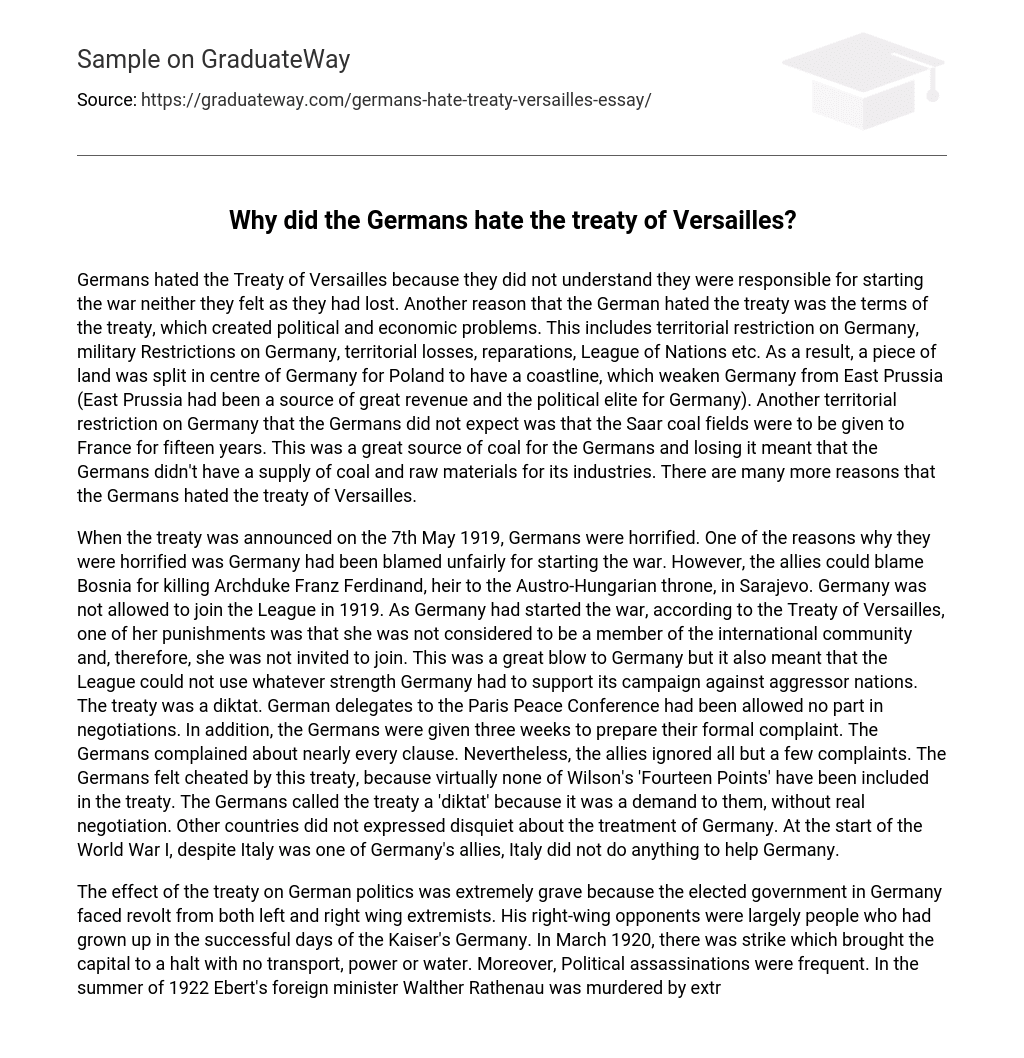The Treaty of Versailles was strongly opposed by the Germans for multiple reasons. They believed that their role in starting the war was not fully acknowledged and did not consider themselves as the losers. In addition, Germany faced political and economic difficulties due to the terms of the treaty such as territorial expansion and military strength restrictions, loss of territory, payment of reparations, and the establishment of the League of Nations. These constraints led to Poland being granted a coastline through dividing German territory, which weakened Germany’s access to East Prussia – an economically and politically significant region. Moreover, France unexpectedly gained control over the Saar coal fields for 15 years, depriving Germany of a crucial source of coal and raw materials necessary for its industries. Numerous other factors also contributed to deep resentment among Germans towards the Treaty of Versailles.
The announcement of the Treaty of Versailles on May 7, 1919, had a profound impact on the Germans for multiple reasons. Firstly, Germany was unjustly blamed for starting the war, despite Bosnia being held responsible for sparking it with Archduke Franz Ferdinand’s assassination in Sarajevo. Moreover, as a punishment for initiating the war, Germany was prohibited from joining the League of Nations in 1919. This exclusion from the global community deprived Germany of support from the League in tackling aggressive nations. The treaty was imposed on Germany as a diktat without involving German delegates in negotiations. Despite having just three weeks to prepare their formal complaint, Germany’s objections were mostly ignored by the allies. This treaty greatly disappointed Germany since it did not incorporate many aspects of Woodrow Wilson’s ‘Fourteen Points’. It was termed a ‘diktat’ by Germans due to its presentation as an ultimatum without genuine negotiation. Other countries showed little concern regarding Germany’s treatment; even Italy, one of Germany’s allies at World War I’s beginning didn’t provide any assistance.
The treaty had a significant impact on German politics, leading to revolt from both left and right wing extremists. Those opposing the government from the right were mainly individuals who grew up during the prosperous era of Kaiser’s Germany. In March 1920, a strike paralyzed the capital city, resulting in a complete halt of transportation, power, and water services. There were also frequent political assassinations. In the summer of 1922, Walther Rathenau, Ebert’s foreign minister, was murdered by extremists. The restrictions on Germany’s military capabilities left the country defenseless. Disarmament was not well-received as German pride was closely tied to its army. Ebert faced criticism for accepting the treaty, causing years of political instability as Germans believed that their country hadn’t been defeated on the battlefield but rather betrayed by their civilian politicians who lacked the courage to continue the war.
The German people faced significant economic hardship as a result of the treaty. One factor contributing to this was that the treaty allowed the French and Belgians to forcefully demand reparations. When Ebert agreed to the treaty, Germany was obligated to make reparation payments, which further worsened its already struggling economy. Additionally, losing territory – including a substantial portion of Germany’s industrial base – dealt a severe blow to German pride. This resulted in Germany losing 12.5% of its population and 10% of its land, impacting its coal and iron industries as well. The terms of the treaty directly caused economic chaos in 1923 when France and Belgium did not receive any payments; as a consequence, they sent troops to seize owed raw materials and goods from the Ruhr region. Furthermore, hyperinflation became another issue in 1923 since the government resorted to printing money due to difficulties in trading goods. As a result, prices and wages skyrocketed; nevertheless, people quickly realized that this currency held no value.
To summarize, the primary reason for detesting the Treaty was the war guilt, where Germany was held responsible for initiating the war and forced to accept a harsh treaty without any choice or input, resulting in further complications for Germany. An example of this is the reparations, with Germany expected to pay for all the damages caused by their actions as the instigators of the war. The war guilt also provided the allies with justification to seize German army, territories, resources, etc., leading to economic and political difficulties. Had the blame for starting the war been apportioned among multiple countries and if Wilson’s Fourteen Points had been considered, allowing Germany to join the League of Nations, Germany would have encountered fewer challenges and its people would have been less inclined towards violence.





